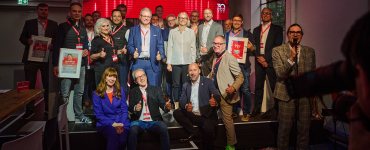- The German Council Presidency has achieved little in the area of sustainable digitalisation
- EU Environment Council adopts Council conclusions on climate-neutral data centres
- eco Alliance for the Strengthening of Digital Infrastructures calls for faster expansion of renewable energies in Germany
- European climate targets can only be achieved with a holistic ecosystem of digital infrastructures
- Recent study published by the eco Alliance provides best practices for sustainable data centres in Germany and Europe
In the context of the German EU Council Presidency, conclusions for sustainable digitalisation were adopted at last week’s meeting of the EU Environment Council. Among other things, these stipulate that data centres should become climate-neutral by 2030. In this context, eco – Association of the Internet Industry and the Alliance for the Strengthening of Digital Infrastructures in Germany, which was founded under the association’s umbrella, are calling for an acceleration of the energy transition in Germany.
“Making data centres – as the backbone of digitalisation – as climate-neutral as possible by 2030 is a goal that is both worthy of support and very ambitious. But the aspiration cannot be that data centres should make up for everything that Germany and Europe, with their backward-looking energy policy, have failed to achieve,” says Dr. Béla Waldhauser, Spokesperson for the Alliance. Germany in particular must therefore now accelerate its climate transition so that Germany as a digital location is not endangered by one-sided burdens on local data centre operators. “Those who demand the climate neutrality of data centres by 2030 must not rely on coal-fired power in Germany until 2038 – that’s how simple this calculation is for the federal government,” Waldhauser states and adds: “It is indisputable that for Germany and Europe to have any chance of achieving their climate targets at all, it will only be possible through the consistent use of digital technologies. The application scenarios and corresponding CO2 savings potentials are known to all, starting with the mobility transition, efficiency increases through Industry 4.0, and the consistent exploitation of the possibilities of mobile working – the eco-balance of digitalisation is clearly positive.”
Data centres in Germany and Europe are already among the most energy-efficient in the world. This has already been demonstrated in the first part of the study “Data Centres in Europe – Opportunities for Sustainable Digitalisation,” which the Alliance published this year together with the Borderstep Institute and with the support of the Vodafone Institute. The second part of the study also presents which innovative technologies and solutions are already in use for this purpose.
German Council Presidency has achieved little in the area of sustainable digitalisation
The German EU Council Presidency has achieved relatively little in the area of sustainable digitalisation in the past six months, according to eco and the Alliance for the Strengthening of Digital Infrastructures in Germany. As such, the demands for sustainable digitalisation in Europe that eco and the Alliance, which consists of important representatives of the data centre industry, set out (in the German language) at the beginning of the German EU Council Presidency, have hardly been taken into account or implemented.
The eco Alliance sees the consistent expansion and operation of a smart mix of needs-based digital infrastructures, a reform of the Energy Tax Directive, and the systematic utilisation of waste heat from data centres as particularly effective for sustainable digitalisation in Europe.
But the balance sheet at the end of the German EU Council Presidency is sobering: For example, although a consultation on the reform of the Energy Tax Directive has taken place, this development is primarily due to the work of the EU Commission. The expansion of renewable energies for sustainable digital infrastructures and the expedient enabling of usage scenarios for waste heat from data centres were also not the focus of the German EU Council Presidency and Federal Environment Minister Svenja Schulze.
“That is clearly too little,” Waldhauser goes on to say. “Climate-neutral digitalisation will only succeed with political support.” While eco and the Alliance for the Strengthening of Digital Infrastructures in Germany are in principle in support of Svenja Schulze’s call for an extension of the Green Deal to include a so-called Digital Green Deal, eco believes that the close involvement of the digital industry and its stakeholders is indispensable in the further development and concretisation of this idea.
“The industry is already well-positioned and sustainable, which is evidenced in no small part by how the Internet industry has enabled the society and the overall economy to continue to function during the pandemic,” says Waldhauser. “The ball is now in the policymakers’ court: Only through the rapid expansion of renewable energy, the consistent utilisation of waste heat from data centres, a broad-scale gapless rollout of fibre, the use of 5G technologies, and the inclusion of green coding approaches in the curriculum of future IT professionals – in other words, only through a holistic ecosystem of digital infrastructures and technologies – will we be able to achieve the EU goal of saving 100 percent of the CO2 emissions from digital infrastructures by 2030. But for this to happen, all stakeholders must commit to this goal together. We are ready.”
More information on the Alliance for the Strengthening of Digital Infrastructures in Germany is available at digital-infrastructures.net/ (German language) and the two parts of the study “Data Centres in Europe – Opportunities for Sustainable Digitalisation” can be found (in English) here:
Part I https://international.eco.de/data-centre-energy-efficiency/
Part II https://international.eco.de/data-centre-energy-efficiency-part-ii/



